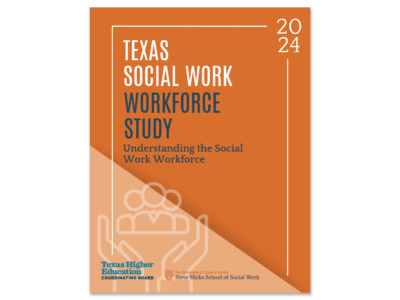The Steve Hicks School of Social Work (SHS) recently published the 2024 Texas Social Work Workforce Study. The study, conducted at the request of the Texas Higher Education Coordinating Board, examines current and projected statewide needs for social workers in behavioral health and identifies strategies to close the gap between the available number of practitioners and the demand for behavioral health services.
The authors included a wide variety of faculty, staff, and students at the Steve Hicks of Social Work. They are:
Cynthia Franklin, PhD, LCSW-S
Laura Dosanjh, PhD, RCC
Sarah K. Sloan, LCSW-S
Tanya Voss, MSSW
Pei-Chiang Lee, MSW
Jeeyeon Hong, MSW
Chrystal Lim, BA
Erin Swearingen, BA
A deficit of social workers and increasing needs
The results, released Friday, October 25, reveal a significant deficit in the current social work workforce and projects the most severe shortages in 2030, particularly in rural areas. In fact, 97% of counties in Texas have been designated as Mental Health Professional Shortage Areas and an additional 1% have partial designations.
While the systematic literature review conducted by the study authors revealed gaps in data due to the lack of a national system for collecting data on social workers, the population data analysis did demonstrate a widening gap between the available number of practitioners and the demand for behavioral health services across Texas.
Closing the gap
The report concludes with several strategies to improve education and work incentives as well as recommendations to mitigate rural behavioral health workforce needs. The recommendations include as educational loan repayment programs, pipeline programs and partnerships. The report also advocates joining the Social Work Licensure Compact, designed to optimize access to licensed social workers in rural and other underserved areas.
The importance of social work
Increasing behavioral health conditions in US populations and the larger health implications and increased mortality rates that often accompany those conditions, underscore the importance of social workers and programs to improve mental and behavioral health across the state.


